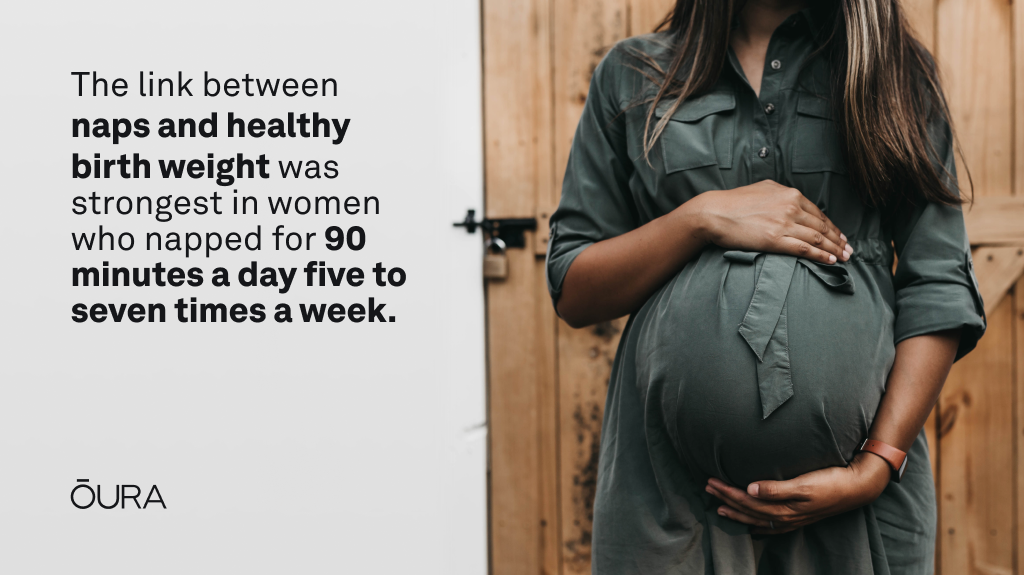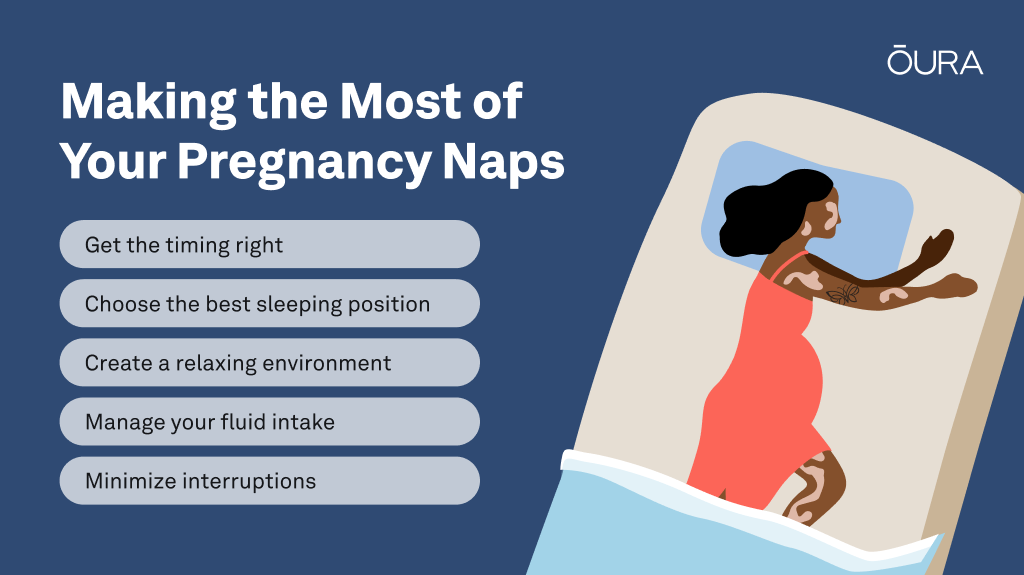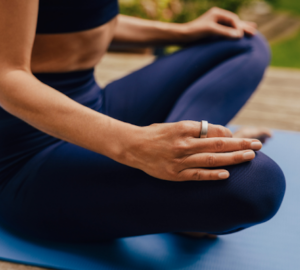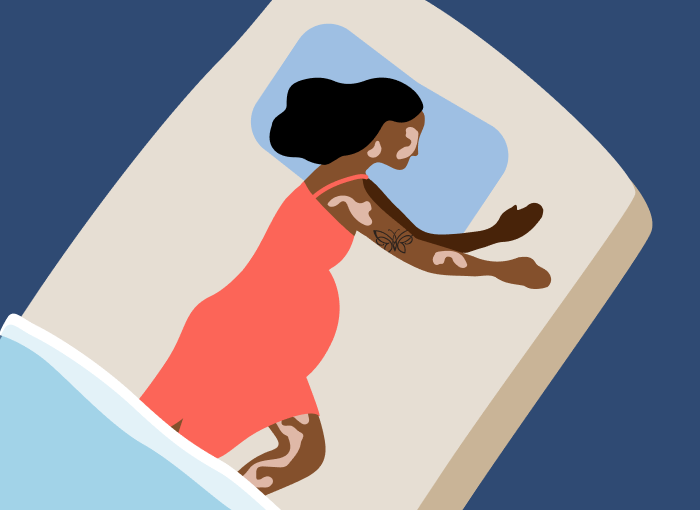Fatigue is one of the first signs of pregnancy — one that, for many women, lasts until birth (and beyond…). It makes sense — your body is busy making a new human, which requires a lot of energy.
Whether you were a napper or not pre-pregnancy, chances are that you have become a daytime snooze aficionado. The good news? Science shows that pregnancy naps benefit both you and your baby — so you have full permission to nod off whenever you want.
RELATED: Naps Around the World
If you’re an Oura member, you’ll receive personalized recommendations in the Oura App based on your daily Readiness Score on how to structure your day. And when you do take a midday snooze, Oura’s Nap Detection feature will record your nap automatically and update your Sleep Score and Readiness Score accordingly.
Of course, finding time to nap isn’t always easy, especially for working mamas or women who already have other children. While we recognize it’s not always going to be possible to nap, if you’re able to sneak off for a siesta, there may be some surprising benefits.
The Case for Pregnancy Naps
As your baby grows, your body undergoes constant physical and hormonal changes, which can be downright exhausting — so it’s no wonder so many women turn to napping as a way to boost their energy while pregnant.
RELATED: The 10 Most Effective Coffee Alternatives for Pregnancy
Pregnancy naps can help pregnant women combat fatigue, reduce stress, and promote better overall health for both you and your baby. Perhaps most significant of all is that research, known as the Healthy Baby Cohort Study, shows taking regular naps during pregnancy is linked to healthier birth weights and a decreased risk of your baby being small.
The Healthy Baby Cohort study was conducted in China and measured the association between afternoon napping in late pregnancy and low birth weight. The results were clear: the more you nap, the better it is for your baby, as the link between naps and healthy birth weight was strongest in women who napped for 90 minutes a day five to seven times a week.

They Can Boost Your Energy
For many women, pregnancy fatigue starts in the first trimester and is often compounded by symptoms such as morning sickness and other discomforts that impact sleep quality.
In the third trimester, fatigue kicks in once again as your baby becomes heavier and your body starts to prepare for birth. Daytime naps while pregnant can help make up for a lack of sleep that may be caused by anything from hormonal changes to frequent bathroom visits during the night, providing a quick burst of energy that can help you get through the day.
They Can Relieve Stress and Elevate Your Mood
There’s nothing like not getting enough sleep to make you feel cranky and anxious — which is not what you need at a time when you have to balance work, life, and preparing for your baby’s arrival.
Fortunately, the effects of sleep for alleviating stress and lifting your mood are well-documented, so getting some extra sleep can help you feel better equipped to handle the challenges of pregnancy.
They Can Help With ‘Baby Brain’
Baby brain — also known as ‘mommy brain’ or ‘momnesia’ — is real, and scientists may finally know why. It’s not just a lack of sleep that causes brain fog during pregnancy — new research suggests that the hormonal changes your body undergoes reduce gray matter and change the way different parts of your brain communicate with one another.
Although napping may not combat the effects of hormonal changes, it might offset some of the effects of having trouble sleeping at night.
They May Alleviate Insomnia
Pregnancy naps can also help with one of the most common pregnancy symptoms: insomnia.
One study found that napping during early pregnancy did not affect nighttime sleep, with researchers recommending naps as a countermeasure to sleep disorders like insomnia.
Make the Most of Your Pregnancy Naps
Napping during pregnancy is necessary but not always easy to achieve. Here are some tips that will help you relax and unwind so you can make the most of nap time.

Time it Right
The Healthy Baby Cohort study showed that women who napped for 90 minutes a day had a significantly lower risk of giving birth to an underweight baby than those who napped for 60 minutes.
READ MORE: How Long Should You Nap? Is There a Perfect Nap Length?
However, don’t let that dishearten you if your work and other responsibilities don’t allow you to nap for that long. The study also indicated that any amount of napping increased the chances of a healthy birth weight.
If you work from home, you may have more flexibility in terms of when you can nap. If not, try talking to your employer about how you can fit nap time into your working schedule.
Choose the Proper Sleeping Position
During pregnancy, your sleeping position matters. For example, there is ample evidence that sleeping on your back during late pregnancy is a risk factor for stillbirth.
Experts recommend sleeping on your left side, as this promotes blood flow to the placenta, helping to keep your baby nourished, and prevents pressure on your liver.
While sleeping on the right side is okay, left is best if possible. Many pregnant women find the best way to get comfortable while sleeping on their side is to use a pregnancy pillow for support.
RELATED: Curling Up in Bed: The Impact of the Fetal Position on Overall Sleep Quality
Create a Relaxing Environment
A relaxing environment can help you sleep better during a pregnancy nap. Turn off your electronic devices, close the curtains, use earplugs or soothing sounds like green noise to minimize interruptions, and make sure the room is at a comfortable temperature.
RELATED: 5 Ways to Upgrade Your Sleep Hygiene
Manage Your Fluid Intake
Although it’s essential to stay hydrated throughout the day, you might want to ease up on the water as you prepare to nap so you don’t have to wake up to use the bathroom.
Minimize Interruptions
It’s not always easy to find time for an uninterrupted nap, especially if your schedule during pregnancy looks similar to your pre-pregnancy one or you already have other little ones running around.
If you can, communicate with coworkers that you’re going to take a nap and ask them not to disturb you. If you have other kids, ask your partner or a trusted friend or family member to watch them while you take a nap.
READ MORE: Member Felicity V. Turned to Oura & Natural Cycles to Help Her Conceive




